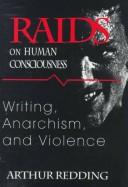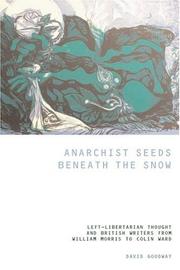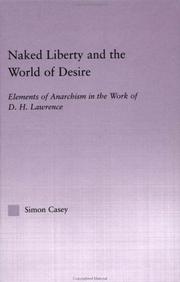| Listing 1 - 10 of 12 | << page >> |
Sort by
|
Book
ISBN: 162894143X 9781628941432 1628941421 9781628941425 9781628941425 Year: 2015 Publisher: New York Algora Publishing
Abstract | Keywords | Export | Availability | Bookmark
 Loading...
Loading...Choose an application
- Reference Manager
- EndNote
- RefWorks (Direct export to RefWorks)
Anarchism in literature --- Literature, Modern --- Literature - General --- Languages & Literatures --- Modern literature --- Arts, Modern --- Literature
Book
ISBN: 1681237202 9781681237206 9781681237183 1681237180 9781681237190 1681237199 Year: 2017 Publisher: Charlotte, NC
Abstract | Keywords | Export | Availability | Bookmark
 Loading...
Loading...Choose an application
- Reference Manager
- EndNote
- RefWorks (Direct export to RefWorks)
Anarchism. --- Anarchism in literature --- Anarchism and anarchists --- Anarchy --- Government, Resistance to --- Libertarianism --- Nihilism --- Socialism
Book
ISBN: 0691641935 069161427X 1400856876 9781400856879 Year: 1982 Publisher: Princeton, New Jersey : Princeton University Press,
Abstract | Keywords | Export | Availability | Bookmark
 Loading...
Loading...Choose an application
- Reference Manager
- EndNote
- RefWorks (Direct export to RefWorks)
This study oilers a new definition of Shelley s place in English radical culture. Treating the poet's literary career as an active intervention in the social world, Professor Scrivener shows how Shelley designed each text to provoke different audiences in a Utopian direction, despite the political repression and other cultural limitations of which he was acutely aware.Originally published in 1982.The Princeton Legacy Library uses the latest print-on-demand technology to again make available previously out-of-print books from the distinguished backlist of Princeton University Press. These editions preserve the original texts of these important books while presenting them in durable paperback and hardcover editions. The goal of the Princeton Legacy Library is to vastly increase access to the rich scholarly heritage found in the thousands of books published by Princeton University Press since its founding in 1905.
Utopias in literature. --- Anarchism in literature. --- Politics and literature --- Utopian literature --- History --- Shelley, Percy Bysshe, --- Political and social views. --- Philosophy.
Book
ISBN: 177212009X 1772120111 9781772120110 1772120014 9781772120011 9781772120097 9781772120103 1772120103 Year: 2014 Publisher: Edmonton, Alberta, Canada
Abstract | Keywords | Export | Availability | Bookmark
 Loading...
Loading...Choose an application
- Reference Manager
- EndNote
- RefWorks (Direct export to RefWorks)
Recovers the significance of the "lost generation"f of writers of the 1930s and 1940s. [The author] examines how the Personalism of anarcho-anti-authoritarian contemporaries such as Alex Comfort, Robert Duncan, Lawrence Durrell, J.F. Hendry, Henry Miller, Elizabeth Smart, Dylan Thomas, and Henry Treece forges a missing link between Late Modernist and postmodernist literature. He concludes by applying his recontextualization to four familiar texts by Miller, Durrell, Smart, and Duncan.
Modernism (Literature) --- English literature --- American literature --- Anarchism in literature. --- Avant-garde (Aesthetics) --- Aesthetics --- Modernism (Art) --- Crepuscolarismo --- Literary movements --- History. --- History and criticism. --- Anarchist Studies. --- Literary Criticism. --- Modernist Literature.

ISBN: 0585336288 9780585336282 1570032300 1570032769 9781570032301 9781570032769 Year: 1998 Publisher: Columbia University of South Carolina Press
Abstract | Keywords | Export | Availability | Bookmark
 Loading...
Loading...Choose an application
- Reference Manager
- EndNote
- RefWorks (Direct export to RefWorks)
American fiction --- Violence in literature. --- Literature and society --- Anarchism --- Violence --- Consciousness in literature. --- Anarchism in literature. --- Violent behavior --- Social psychology --- Anarchism and anarchists --- Anarchy --- Government, Resistance to --- Libertarianism --- Nihilism --- Socialism --- History and criticism --- Theory, etc. --- History --- Theory, etc --- 20th century --- Violence in literature --- United States --- Consciousness in literature --- Anarchism in literature
Book
ISBN: 9782843102714 2843102715 2377471064 Year: 2014 Volume: *12 Publisher: Grenoble ELLUG
Abstract | Keywords | Export | Availability | Bookmark
 Loading...
Loading...Choose an application
- Reference Manager
- EndNote
- RefWorks (Direct export to RefWorks)
L'anarchisme a entretenu des rapports complexes et constants avec le monde des lettres depuis sa toute première apparition sur la scène politique. Au-delà de la période de la fin du siècle, marquée par les attentats à la bombe qui ont inscrit le fantasme de l'anarchiste dynamiteur dans l'imaginaire du grand public, et au-delà des rapports avec le symbolisme et les avant-gardes poétiques, auxquels on a souvent réduit l'influence de l'anarchisme dans la sphère littéraire, ce livre propose de redécouvrir les productions variées des auteurs qui ont mis leur plume au service du drapeau noir, de 1848 jusqu'à la fin des années 1930. À travers nombre de sources inédites et avec une attention particulière à la création et aux débats littéraires véhiculés par les nombreux journaux et périodiques de la presse militante, sont ainsi examinés les rapports des anarchistes avec les grands mouvements littéraires de l'époque (romantisme, réalisme, naturalisme, symbolisme) et la conception anarchiste de la culture et de l'éducation. On explore les œuvres des auteurs appartenant au monde de la culture officielle qui ont mis en scène des anarchistes dans leurs romans - dont Anatole France, Montherlant, Ernest Psichari, Villiers de l'Isle-Adam, Roland Dorgelès et d'autres encore -, pour passer ensuite aux littérateurs proches de l'anarchisme ou actifs dans le mouvement. Reviennent alors les noms de plusieurs écrivains ayant joui en leur temps d'une certaine notoriété - Han Ryner, J. H. Rosny aîné, Jules Lermina, Jehan Rictus -, et ceux de quantité d'autres - Brutus Mercereau, Fernand Kolney, Henri Rainaldy, K. X. et de nombreux nouvellistes - demeurés presque totalement inconnus en dehors des cercles libertaires. Se dessine ainsi l'esquisse d'un milieu vivant à la culture riche et diversifiée, sur un arc temporel bien plus long que celui à l'intérieur duquel on a généralement tendance à la limiter.
Anarchism in literature --- Anarchism --- French literature --- Anarchisme dans la littérature --- Anarchisme --- Littérature française --- Anarchisme dans la littérature --- Littérature française --- Literature --- révolution sociale --- marginalité --- anarchie --- propagande --- militantisme --- XXe siècle --- symbolisme --- Naturalisme --- réalisme --- misérabilisme
Book
ISBN: 1772124052 9781772124057 9781772123760 9781772126471 1772126470 Year: 2018 Publisher: Edmonton : University of Alberta Press,
Abstract | Keywords | Export | Availability | Bookmark
 Loading...
Loading...Choose an application
- Reference Manager
- EndNote
- RefWorks (Direct export to RefWorks)
Dani Spinosa takes up anarchism's power as a cultural and artistic ideology, rather than as a political philosophy, with a persistent emphasis on the common. She demonstrates how postanarchism offers a useful theoretical context for poetry that is not explicitly political-specifically for the contemporary experimental poem with its characteristic challenges to subjectivity, representation, authorial power, and conventional constructions of the reader-text relationship. Her case studies of sixteen texts make a bold move toward politicizing readers and imbuing literary theory with an activist praxis-a sharp hope. This is a provocative volume for those interested in contemporary poetics, experimental literatures, and the digital humanities.
aktivisme --- digital lyrikk --- Semiotics and literature. --- Experimental poetry --- Anarchism in literature. --- Avant-garde poetry --- Literature, Experimental --- Poetry --- Literature and semiotics --- Literature --- History and criticism. --- digital poesi --- postanarkisme --- Digital media. --- 2000-2099

ISBN: 9781846312557 1846312558 1846310253 9781846310256 1846310261 9781846310263 1781386110 9781781386118 Year: 2006 Publisher: Liverpool : Liverpool university press,
Abstract | Keywords | Export | Availability | Bookmark
 Loading...
Loading...Choose an application
- Reference Manager
- EndNote
- RefWorks (Direct export to RefWorks)
From William Morris to Oscar Wilde to George Orwell, left-libertarian thought has long been an important but neglected part of British cultural and political history. In Anarchist Seeds beneath the Snow, David Goodway seeks to recover and revitalize that indigenous anarchist tradition. This book succeeds as simultaneously a cultural history of left-libertarian thought in Britain and a demonstration of the applicability of that history to current politics. Goodway argues that a recovered anarchist tradition could - and should - be a touchstone for contemporary political radicals. Moving seamlessly from Aldous Huxley and John Cowper Powys to the war in Iraq, this challenging volume will energize leftist movements throughout Britain and the rest of the world.
Anarchism in literature. --- Anarchism --- Libertarianism in literature. --- Libertarianism --- Individualism --- Liberty --- Anarchism and anarchists --- Anarchy --- Government, Resistance to --- Nihilism --- Socialism --- Anarchists --- Libertarians --- Persons --- Morris, William, --- Powys, John Cowper, --- Wilde, Oscar, --- Read, Herbert, --- Huxley, Aldous, --- Ward, Colin,
Book
ISBN: 1137502886 1137495855 1349699683 Year: 2016 Publisher: New York : Palgrave Macmillan US : Imprint: Palgrave Macmillan,
Abstract | Keywords | Export | Availability | Bookmark
 Loading...
Loading...Choose an application
- Reference Manager
- EndNote
- RefWorks (Direct export to RefWorks)
This book looks at the inception, composition, and 1907 publication of The Secret Agent, one of Joseph Conrad’s most highly regarded political novels and a core text of literary modernism. David Mulry examines the development and revisions of the novel through the stages of the holograph manuscript, first as a short story, then as a serialized sensation fiction in Ridgway’s Militant Weekly for the American market, before it was extensively revised and published in novel form. Presciently anticipating the climate of modern terror, Conrad’s text responds to the failed Greenwich Bombing, the first anarchist atrocity to occur on English soil. This book charts its historical and cultural milieu via press and anarchist accounts of the bombing, to place Conrad foremost among the dynamite fiction of revolutionary anarchism and terrorism in the late nineteenth and early twentieth centuries. .
Literature. --- Literature --- European literature. --- British literature. --- British and Irish Literature. --- Literary History. --- European Literature. --- History and criticism. --- European literature --- Appraisal of books --- Books --- Evaluation of literature --- Belles-lettres --- Western literature (Western countries) --- World literature --- Appraisal --- Evaluation --- Anarchism in literature. --- Conrad, Joseph, --- Literature-History and criticism. --- Literature—History and criticism.

ISBN: 020360508X 1135888671 1280057920 0203503651 9780203503652 9786610057924 6610057923 0415965926 9781135888671 9781280057922 9781135888626 9781135888664 9780415965927 9780415762595 0415762596 1135888663 Year: 2003 Publisher: New York Routledge
Abstract | Keywords | Export | Availability | Bookmark
 Loading...
Loading...Choose an application
- Reference Manager
- EndNote
- RefWorks (Direct export to RefWorks)
In this new and original study, Simon Casey explores the long-neglected link between D. H. Lawrence and philosophical anarchism. Focusing on the writings of some of the major anarchists-with particular emphasis on Stirner, Godwin, Bakunin and Thoreau-this book argues that the conceptual parallels between Lawrence and anarchism are strong and extensive and that reading Lawrence within the context of this tradition significantly enhances any understanding of his work. Lawrence's faith in the essential decency of human nature, his forceful defense of individual liberty, and his intolerance of all
Anarchism in literature. --- Lawrence, D. H. --- Lawrence, David Herbert --- Davison, Lawrence H. --- Lorensŭ --- Lorensŭ, D. H. --- Lourens, D. G. --- Lorenss, D. H. --- Lorens, Deĭvid Gerbert --- Lārensu, Ḍi. Ec. --- Lourens, Dėvid Gerbert --- לאורנס, ד. ה. --- לאורענס --- לורנס, ד״ה --- לורנס, ד.ה., --- לורנס, ד.ה..., --- Political and social views. --- Lawrence, D.H.
| Listing 1 - 10 of 12 | << page >> |
Sort by
|

 Search
Search Feedback
Feedback About UniCat
About UniCat  Help
Help News
News